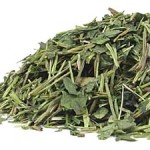 Gotu Kola is popularly used as a food source within Bangladesh, Thailand, and Sri Lanka. It is rich in vitamin C, and is often served with rice, curries, and other vegetarian dishes. It also has been internationally recognized within the pharmacopoeias of many countries as a valid, botanical medicine since 1884. It is used to support healthy veins and circulation. It is also used externally for minor wounds and burns. The herb is traditionally used to promote calmness and relaxation, but there is little clinical data to support this. One study did however show that gotu kola attenuates the acoustic startle response in healthy subjects.
Gotu Kola is popularly used as a food source within Bangladesh, Thailand, and Sri Lanka. It is rich in vitamin C, and is often served with rice, curries, and other vegetarian dishes. It also has been internationally recognized within the pharmacopoeias of many countries as a valid, botanical medicine since 1884. It is used to support healthy veins and circulation. It is also used externally for minor wounds and burns. The herb is traditionally used to promote calmness and relaxation, but there is little clinical data to support this. One study did however show that gotu kola attenuates the acoustic startle response in healthy subjects.
About Gotu Kola
Gotu Kola, also known as Indian Pennywort is one of the most widely used and important Ayurvedic herbs on the market today. It has been used in Ayurvedic medicine for thousands of years and is thought to be one of the most spiritual and rejuvenating herbs in Ayurveda. It is also thought to increase psychic sensitivity. This ground cover species is weed like, especially in parts of India and Hawaii where it grows prolifically in unusual conditions, such as drainage ditches, gutters and neglected areas. Don’t let its wild predomination scare you, Gotu Kola is also one of the largest cultivated crops in India and thrives under organic farming conditions. While popularly used as a food source rich in vitamin C in the form of leafy greens within Bangladesh, Thailand and Sri Lanka it also has been internationally recognized within many countries pharmacopoeias and has been a valid, recognized, botanical medicine since 1884.
Gotu Kola is also known as Centella asiatica, Brahmi, Indian Pennywort, Marsh Penny, Spadeleaf, Tiger’s Herb, and Pennywort.
Constituents: Mainly consisting of triterpenoid saponins, sapogenins.
Parts Used: Leaf. Either fresh or dried.
Typical Preparations: Tea from the dried leaves, encapsulated dry leaf, liquid herbal extract and, using fresh leaves from your garden in your salads, beverages and medicines.
Precautions: None noted.
